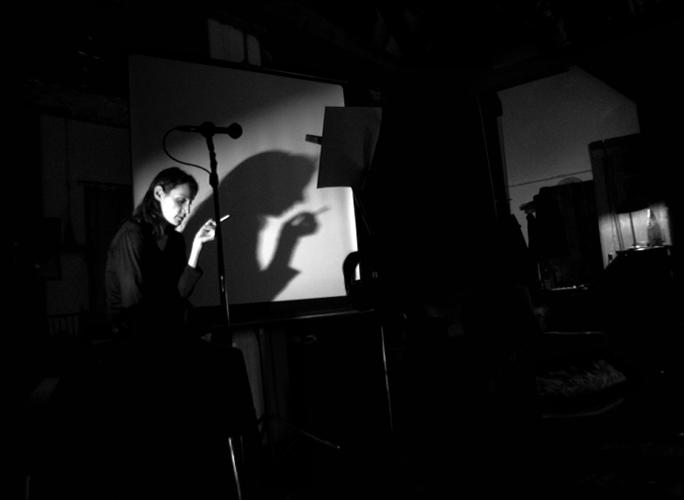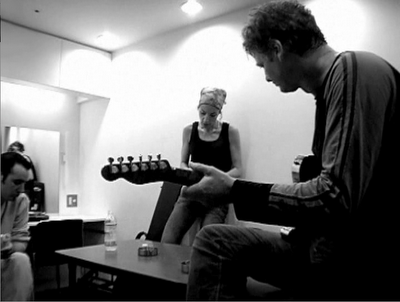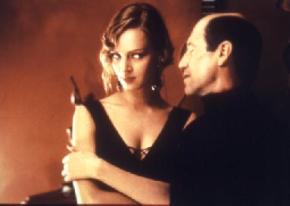Written for Filmkrant‘s “Slow Criticism”, February 2010 (no. 318). — J.R.

There’s a personal reason why Ne Change Rien comes together for me in a way that few music documentaries do. Eight years ago, I was approached by Rick Schmidlin, the producer of the 1998 re-edit of Touch of Evil (on which I’d served as consultant), about writing or directing — in any case, helping to conceptualize — a documentary about jazz pianist McCoy Tyner. This led to a lengthy conversation with Tyner in Chicago and then a three-page treatment that I prepared with cinematographer John Bailey via phone and email, which concluded, “Any film that’s about listening, as this one will be, will also be about looking — predicated on the philosophy that the way one looks at musicians already helps to determine the way one listens to them.”

For me one of the ruling ideas was that few jazz films, apart from a handful of the very best, focused enough on the spectacle of jazz musicians listening to one another. And I saw (and heard) the whole thing as a two-way process — the way one listens should dictate the way one looks, as well as vice versa. Read more
From the Chicago Reader (August 13, 1993). — J.R.

RISING SUN
** (Worth seeing)
Directed by Philip Kaufman
Written by Kaufman, Michael Crichton, and Michael Backes
With Sean Connery, Wesley Snipes, Harvey Keitel, Cary-Hiroyuki Tagawa, Kevin Anderson, Mako, Ray Wise, Stan Egi, Stan Shaw, and Tia Carrere.

Before seeing Rising Sun and then reading the Michael Crichton thriller it’s based on, I happened to read four negative reviews of the movie, and was more than a little taken aback by them. Here are samples of what I found:
“Following the cut-and-dried police procedural structure of the book, cowriter and director Philip Kaufman has soft-pedaled the critique of Japanese behavior stateside, which may reduce justification for protests against the film, but also removes much of the material’s bite.” (Todd McCarthy, Variety)
“Trying to transcend the material, the director loses the novelist’s crude but compelling urgency.” (David Ansen, Newsweek)
“Crichton’s novel was largely powered by his animus against the Japanese business culture, and perversely, you miss his outrage.” (Richard Schickel, Time)
“Crichton, in his novel, was accused (with some justification) of Japan-bashing, but if his vision of Japanese executives as omnipotent control freaks had a racist tinge, it was also sinister fun. Read more
From the Chicago Reader (October 26, 1990). — J.R.
HENRY & JUNE
** (Worth seeing)
Directed by Philip Kaufman
Written by Philip and Rose Kaufman
With Fred Ward, Uma Thurman, Maria de Medeiros, Richard E. Grant, Kevin Spacey, and Jean-Philippe Ecoffey.

“There are larval thoughts not yet divorced from their dream content, thoughts which seem to slowly crystallize before your eyes, always precise but never tangible, never once arrested so as to be grasped by the mind. It is the opium world of woman’s physiological being, sort of a show put on inside the genito-urinary tract. There is not an ounce of man-made culture in it; everything related to the head is cut off. Time passes, but it is not clock time; nor is it poetic time such as men create in their passion. It is more like that aeonic time required for the creation of gems and precious metals; an embowelled sidereal time in which the female knows that she is superior to the male and will eventually swallow him up again. The effect is that of starlight carried over into day-time.”
This elegant huffing and puffing belongs to Henry Miller, writing about the journals of Anais Nin in a 1939 essay called “Un Etre Etoilique” (A Starlike Being), collected in The Cosmological Eye. Read more






